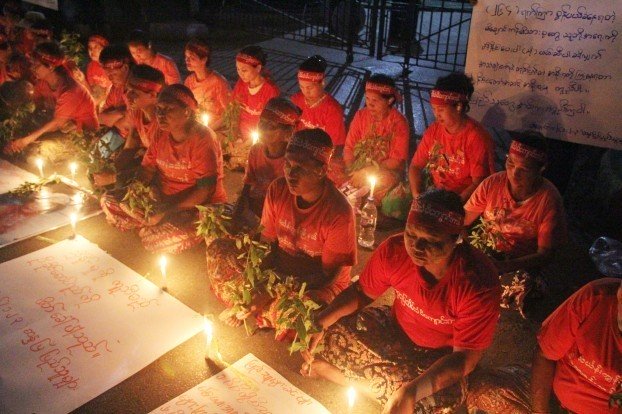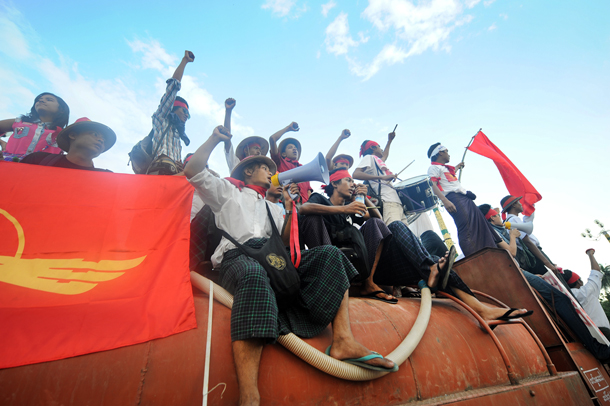Posts Tagged ‘Peaceful Protest’ (12 found)
Press Release: Burma Must Tackle Underlying Root Causes of Protests
(28 May 2015) The Burma Government should treat the underlying structural causes of the recent outbreak of protests in Burma rather than using violence against demonstrators, Burma Partnership said in a new briefing paper released today […]
• • •Marching to the Same Tune? A Briefing Paper on Protests and Freedom of Assembly in Burma
 Background
Background
Facilitated by the proliferation of social media as an agent for social and political change over the last five years, mass organized protests have simmered and erupted across the globe. From the 2011 “Arab Spring” in the Middle East and North Africa, to the Occupy Movement in Western cities, from the 2013 Maidan Square Revolution in Ukraine, to the recent Umbrella Revolution in Hong Kong, from stifled democracy movements in Iran, Russia and Cambodia, to austerity protests in southern Europe and the 2014 race protests in Ferguson, Missouri, United States, mass protests have been a defining feature of the decade thus far. Neither is Burma a stranger to mass public protests, especially given its history of the pro-democracy student uprising in 1988 and the monk-led Saffron Revolution in 2007. While it is still premature to claim that 2015 has been another key protest year in Burma, on a par with 1988 and 2007, protests have nevertheless dominated the headlines so far this year […]
• • •AAPP Condemns the Use of Violence and Torture in Burma and Demands the Immediate Unconditional Release of All Political Prisoners
The recent violent crackdowns against the peaceful student demonstrators and their supports resulted in the detention of at least 127 people. AAPP vehemently condemns the disproportionate force used by the police and demands accountability for those responsible for the violence seen in both Letpadan and Rangoon […]
• • •ASEAN Youth Forum Strongly Condemns Brutality and Violence Taken Against Students Protest in Myanmar!!!
The endless and painful struggle of Myanmar students for education reform has resulted to violence and brutality of the police in Yangon and Letpadan […]
• • •In the Face of Government Intransigence, Burma’s Students March On
In Burma Partnership’s 2014 end-of-year review, we identified the role of student unions in Burma’s political affairs as one of the more notable and inspiring developments of 2014: “Burma’s students were always at the center of major democracy movements throughout history – most notably in 1988 – and have now made a comeback.” Furthermore, we declared that “it is the students that represent the greatest hope for the people of Burma – and the greatest threat to the Burma Government. It is vital that their progressive voice continues to be heard.” Indeed, these forecasts have been borne out, as January 2015 has seen the student movement go from strength to strength.
The underlying catalyst for this burgeoning student movement – and wider public support for it – is the overwhelming conclusion that Burma’s so-called reforms have now hit crisis point. Objections started with more “big picture” accusations that the political reforms initiated in 2011 have proven to be fake, accusations that are now crystallizing into fears that the national elections slated for later this year will be fixed, postponed or cancelled. More recently, students have honed in on specific issues, most notably education reform, land rights abuses, and violent responses to peaceful protests on the part of the authorities. […]
• • •ဒီမုိကေရစီ ပညာေရးလွဳပ္ရွားမွဳ ဦးေဆာင္ေက်ာင္းသားမ်ား၏ ခ်ီတတ္ဆႏၵျပမႈအေပၚ လူ႔အခြင့္အေရး ကာကြယ္ျမွင့္တင္သူမ်ားအဖြဲြ႕ (HRDP) ၏ ထုတ္ျပန္ခ်က္
ဒီမုိကေရစီ ပညာေရး လွဳပ္ရွားမွဳ ဦးေဆာင္ေက်ာင္းသားမ်ား၏ ခ်ီတက္ဆႏၵျပမႈၾကီးသည္ လူ႔အခြင့္အေရး စံခ်ိန္ စံညႊန္းမ်ားႏွင့္ လုံး၀ကုိက္ညီမွဳ ရွိေပသည္။ လြတ္လပ္စြာ ပညာသင္ၾကားခြင့္ကုိ ေတာင္းဆုိျခင္း၊ အခ်ဳပ္အျခာ ကင္းသည့္ ပညာေရး လြတ္လပ္ခြင့္ကုိ ေတာင္းဆုိျခင္းတုိ႕ေၾကာင့္ ယေန႔ေက်ာင္းသားတုိ႔ သပိတ္ေမွာက္ ေတာင္းဆုိျခင္းသည္ လူ႔အခြင့္အေရးဆုိင္ရာ ခုခံကာကြယ္ျခင္းျဖစ္ေပသည္။ […]
• • •အမ်ဳိးသား ပညာေရးဥပေဒအား ေက်ာင္းသားမ်ား ကန္႔ကြက္ဆႏၵျပျခင္းအေပၚ ၈၈မ်ဳိးဆက္ (ၿငိမ္းခ်မ္းေရးႏွင့္ ပြင့္လင္း လူ႔အဖြဲ႕အစည္း)၏ သေဘာထားေၾကညာခ်က္
(၁) အမ်ဳိးသား ပညာေရး ဥပေဒသည္ ေက်ာင္းသားမ်ား၏ အနာဂတ္၊ တနည္းအားျဖင့္ လူသား အရင္းအျမစ္ ဆုိင္ရာ ႏုိင္ငံ၏ အနာဂတ္လည္းျဖစ္သည္။ […]
• • •Statement regarding the Need for Creation of National Education Policies and Laws for Realization of Democratic Education System
Action Committee for Democratic Education (ACDE) is comprised of All Burma Federation of Student Unions and University Student Unions. The Committee was established and its members were elected during the nationwide student emergency conference convened on 12-13 November 2014 […]
• • •Statement of civil society organization on students’ actions against National Education Law following the overdue 60-day deadline for negotiation
Education sector reform during transition period is very important and vital for the future of Myanmar
The 60-day period for negotiation declared by students has passed and students have resumed their protest activities against the National Education Law. Student from Mandalay have begun their march from Mandalay to Yangon on the 20 January while students from other parts of the country have carried out their protest activities in their respective areas as well […]
Michaungkan Protesters Light Candles in Front of Rangoon City Hall
 Villagers from the eastern Rangoon suburb of Michaungkan staged a peaceful candlelit vigil outside Rangoon City Hall on December 12, in protest of the government’s controversial land grabs.
Villagers from the eastern Rangoon suburb of Michaungkan staged a peaceful candlelit vigil outside Rangoon City Hall on December 12, in protest of the government’s controversial land grabs.
The protestors claim they lost their land under government redevelopment plans and have been occupying a protest camp near Maha Bandoola Park in the city centre for more than 260 days. […]
• •









 All posts
All posts